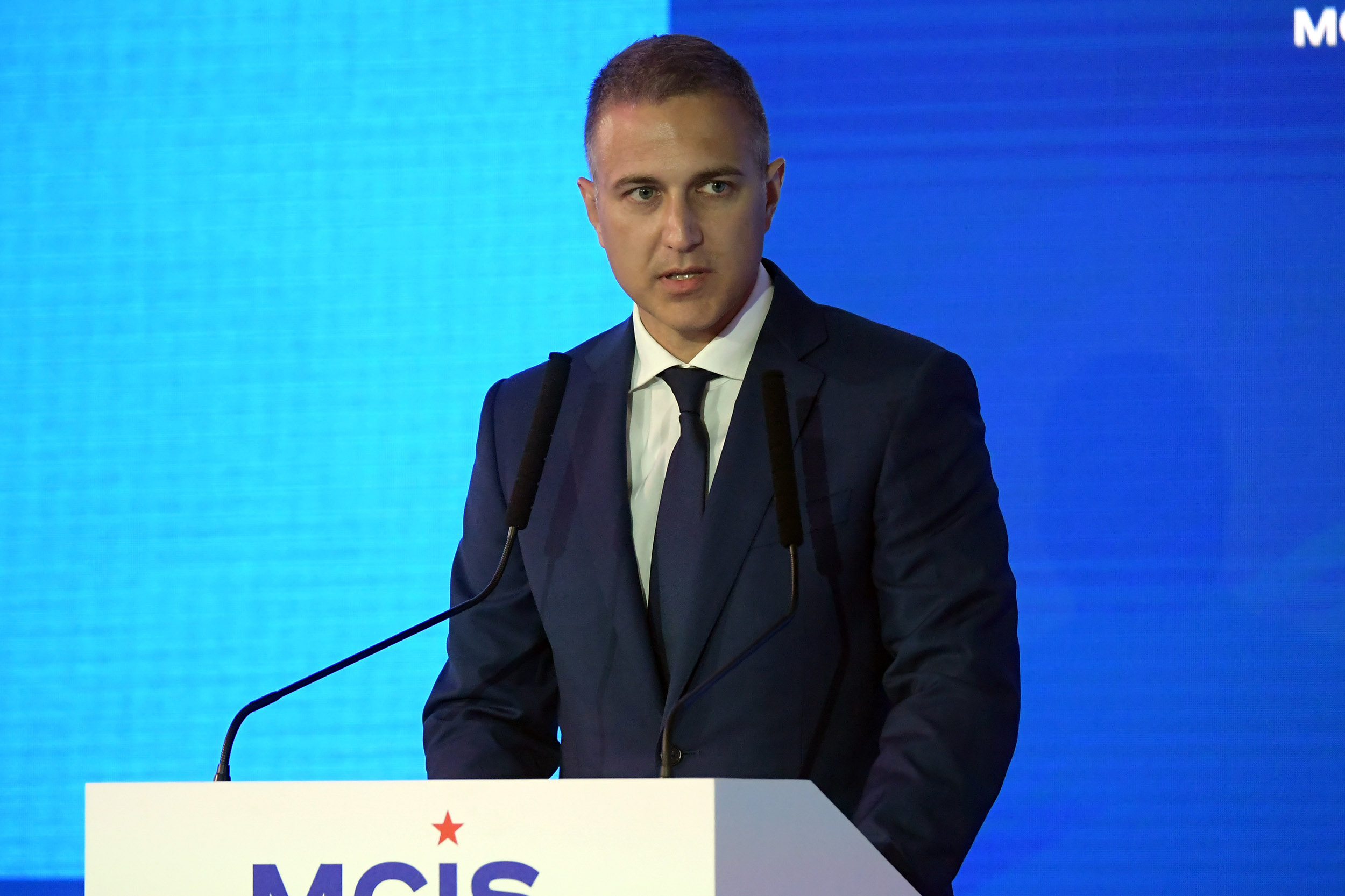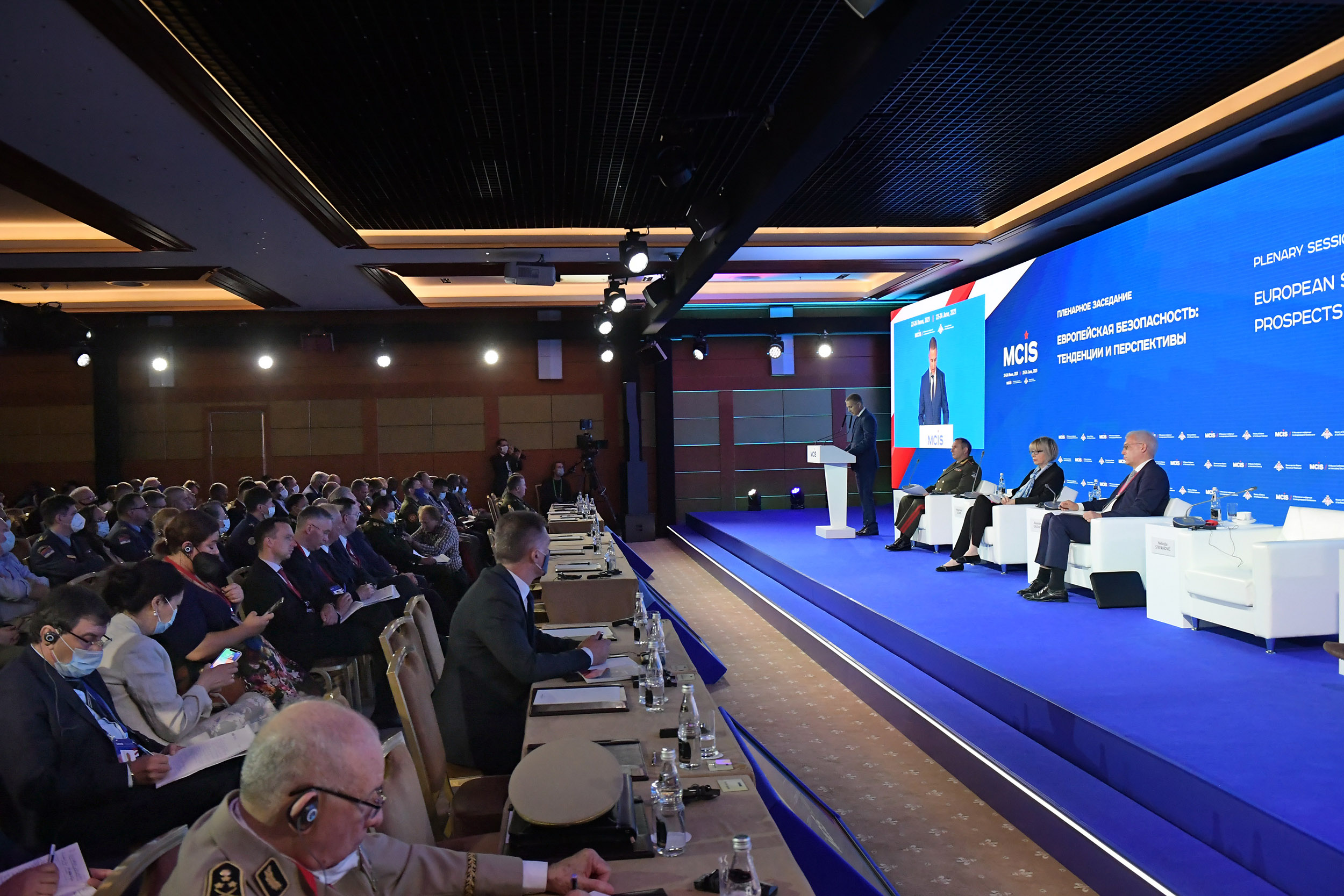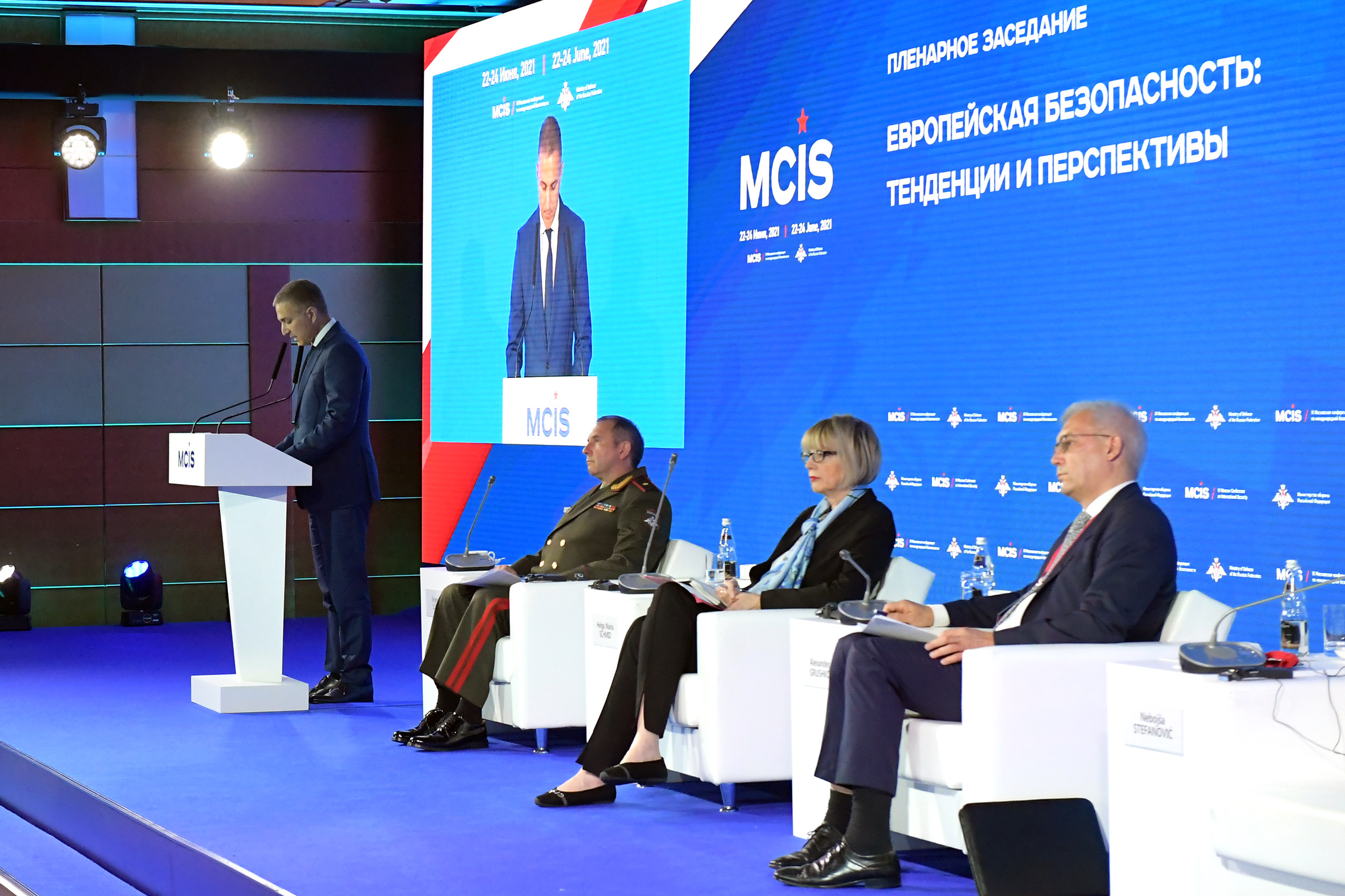24.06.2021.
Minister Stefanović Thanked Russia for the Support in the Matter of Kosovo and Metohija
Today, Deputy Prime Minister and Minister of Defence Nebojša Stefanović PhD thanked the Russian Federation for its support that we have always enjoyed in our requests for the respect of sovereignty and territorial integrity of our country. “The Serbian people will not forget that, and I thank you from the bottom of my heart”, said Minister Stefanović in his address at the 9th Moscow conference on international security.

At the beginning of the second day of the conference, during which the minister gave his address, the participants were also addressed by Director of the Foreign Intelligence Service of the Russian Federation Sergey Naryshkin, Head of Russian Diplomacy Sergey Lavrov and Secretary of Security Council of Russia Nikolai Patrushev.
“Today, the world is facing security challenges which are, without any doubt, increasingly global in their character, starting from terrorism to organised crime and cyber threats. Those who believe that they can overcome such challenges on their own are under grave misapprehension, and we are more than ever oriented to one another, oriented towards cooperation and dialogue. The Republic of Serbia is oriented to cooperation and dialogue even when it comes to so-called Kosovo. We make efforts to contribute to normalisation of relations in order to protect the Serbian population and our sacred objects in Kosovo and Metohija” Stefanović said in his address on the topic of “Multilateral dialogue in the field of security and conflict prevention aimed at building confidence in the Western Balkan region”.
There is no normal life today even for the Albanians, much less the Serbs
As he emphasised, Serbia will continue resolutely advocating for consistent abiding by provisions of international law and Resolution 1244 of the United Nations Security Council.
“Trampling on international law by international community and violation of our sovereignty is precisely one of the examples of the absence of dialogue, the consequence of which is that today we have a false entity established in our southern province, which has for years been a source of both security threats for the entire Europe, and one of the greatest sources of instability in the Western Balkans. Today, even the countries which sponsor so-called independence of Kosovo do not argue that it is both the base of trade in narcotics and the exporter of radical extremism in the heart of Europe. Today it is a place where there is no normal life even for Kosovo Albanians much less the Serbs and other population” Stefanović stressed.

The Western Balkans – a powder keg or the oasis of peace
Speaking about the stability of the Western Balkans, the minister reminded that atypical geographic position of the Balkans over centuries had caused numerous armies to come in these parts bringing many wars, leaving a multitude of security problems which are difficult to resolve even in the present.
“That area is the point where different religions meet, while the multiculturalism and ethnic diversity at the same time present the richness and a challenge. Throughout history, these diversities in the Balkans, had been transformed from bridges of cooperation and opulence into divisions which, not so seldom, led to conflicts. The complex political and security situation in certain Balkan states and unresolved ethnic and national issues considerably affect the stability of the entire region today”, Stefanović said.
As he stated, the answer to the question if the Western Balknas will in the period to come be a “powder keg” or the “oasis of peace”, will depend in the future on a multitude of factors, and most certainly on sincere multilateral dialogue among international actors. The minister underlined that Serbia is oriented towards becoming a guarantor and factor of peace and stability in this part of the world.
We wish to give our contribution to development of European security
“I would also like to point out that the multiculturalism, as the fundamental idea of the European policy, has demonstrated certain weaknesses, both within the borders of the European Union, and in relations with other international subjects, which was particularly visible during the migration crisis and during the fight against COVID-19 outbreak. It is a good thing that the EU has observed these problems, and it confronted them, and it is also a good thing that it has been changing the mechanisms to respond to crisis, building a stronger security system among the member states. At the same time, it showed its readiness to involve other countries as well, both candidate states and other non-candidate states so that all could contribute to the greater security of Europe” Stefanović said.
He also reminded that EU member states are dedicated to the preservation of peace through the participation in multinational operations worldwide, where Serbia plays a significant role, which we deem important, because the security that is built beyond European borders is important for the preservation of security in the territory of Europe.
“The professionalism and dedication of the Serbian Armed Forces members in those missions are recognised and highly valued by all countries where we are located within those missions. As a country that geographically belongs to this area, we are strategically oriented towards the EU membership and we wish to give our contribution to the development of European security. That is why we work with the EU on developing various security mechanisms, starting from civil protection system, where we, on the other hand, have established cooperation at equally high level with our friends from Russia. I need not remind of the immense assistance that it offered during the floods that had afflicted our country in 2014, and in the present COVID crisis when our countries have initiated the joint production of Sputnik V vaccine in our Torlak institute” the minister of defence stated.

Multilateral approach – the only way to a security consolidation of the Western Balkans
According to his estimation, a multilateral approach to the resolution of problems is founded on mutual understanding and respect for international norms, and it is the only right path to security consolidation of the Western Balkans region”.
“That is why we particularly value the principled position of the Russian Federation and its endeavours to resolve the security issues of the Western Balkans states in a manner that is grounded on provisions of international law and under the auspices of relevant multilateral formats “ Stefanović explained.
He stated that even in circumstances of insufficient efficiency of different multilateral formats with regards to the Western Balkans and despite the slowness of European integration, regional initiatives were ever increasing their importance.
“They are important today, if not critical, in terms of security consolidation of the region. Accordingly, the Republic of Serbia is strongly and unequivocally interested in building common regional mechanisms for the prevention of risks and threats, and crisis management mechanisms as well, which it has proven in practice while finding optimal responses to challenges caused by COVID-19 outbreak” the minister stated.
He reminded that Serbia, among other, had selflessly assisted many surrounding countries with vaccinations.
Security of the region is common interest, and the obligation of all who live in these parts
“Multilateral cooperation represents a framework within which Serbia tries to point out the importance of enhancing the awareness of the fact that the security of the region is the common interest, and the obligation of all who live in these parts. The differences and problems can be overcome exclusively through cooperation based on readiness to turn to common future. It is only through a multilateral dialogue that we can comprehend the wider spectrum of requirements and interests, thus reducing the room for exclusiveness and extreme interpretations. Furthermore, a complete, not selective implementation of achieved agreements is of key importance for the credibility of states and preservation of confidence” Stefanović highlighted.
He concluded that it was COVID-19 outbreak in particular that additionally underscored our obligation to replace the trends of unilateralism, fragmentation and confrontation with solidarity and mutual respect, and to do so by reinforcing the existing multilateral formats, primarily the United Nations Organisation and OSCE.
“Strengthening of true dialogue and partnership founded on the principles and equal grounds in these highly demanding times, simply becomes an imperative in order to achieve the common goal – peace, stability and prosperity” Stefanović concluded.




